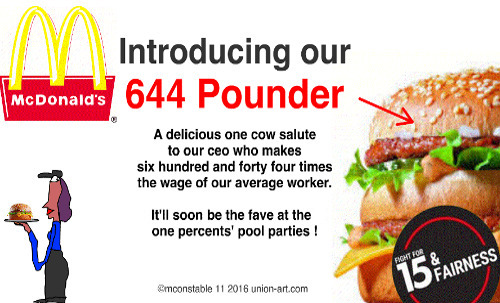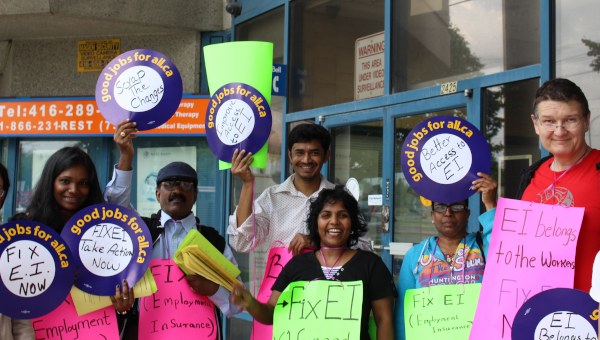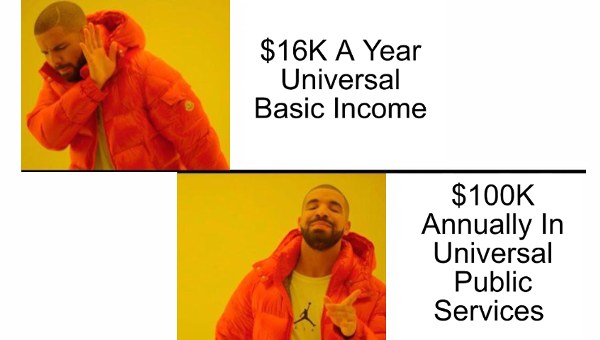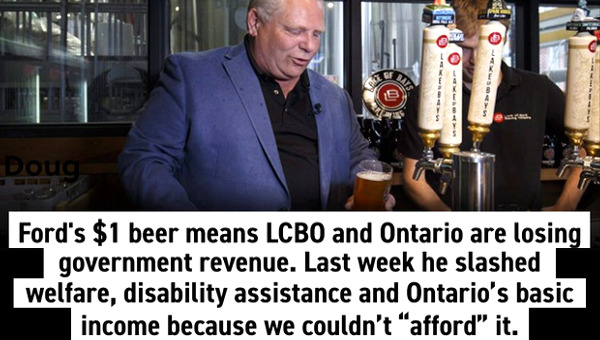The Ontario Government’s Adviser on Basic Income (BI), Hugh Segal, has released his much heralded discussion paper, “Finding a Better Way,” that sets out his proposals for a lengthy BI pilot project. If the experiment he advocates is put into effect, it will run parallel to the deliberations of a Security Reform Working Group that will be considering changes to the present social assistance system in the province, rather than replacement to it.

when considering the nature and possibilities of BI in general but, before taking this up, a few comments are necessary on the particular
features of the situation in this province. As far as we’re concerned, there is no reason to believe that the Ontario Liberals have the slightest intention of improving the lot of those living in poverty and their track record can only lead to the conclusion that they are putting in place another round of futile deliberations to divert attention from their real agenda of austerity and war on the poor.Consultations of this kind have been used for years now to trick people into believing action on poverty is being prepared, as real incomes have declined, related benefits and supports have been cut and the numbers forced to work for poverty wages has grown massively. Bluntly, even if we believed that Basic Income was a viable and likely means of addressing poverty and inequality, we would remain convinced that the impending consultative circus is an exercise in duplicity. The Liberals aren’t acting in good faith
and, in any event, the process of deliberations will extend beyond the present political mandate of this deeply unpopular government.
Liberal Machinations
From the standpoint of the Liberal’s political machinations, the most useful thing about “Finding a Better Way” is how much it helps them delay the search. The paper calls for a round of public consultations, a period in which the Government will prepare a pilot, at least three years of testing it out and, then, a review of the findings that will doubtless proceed at a glacial pace. However, for such a lengthy undertaking and a study of a concept that has such far reaching implication as Basic Income, Segal’s plans are remarkably unimaginative.
He wants to gather together “an arm’s length coalition of competent not-for-profit research organizations” (p35) to run a project that will recruit a sampling of the poorest people and test out the results of making them a bit less poor. The idea is to gather test subjects mainly from among those on social assistance but including others who are selected “regardless of their status in the labour market.” The income of this grouping would then be
increased to 75% of the Low Income Measure from (for the very poorest) the present level of 45%. The scrutiny and moral policing normally associated with receiving social assistance would be removed and their ability to earn extra income would be enhanced (p8). The people who would be tested would be geographically dispersed across Ontario, but there would be three “saturation sites” where all those eligible would be offered the chance to participate (p53).
Contrary to Segal’s assertion that “(t)here is no way of predicting what a properly managed and objective pilot will produce in terms of results,” (p72) the findings of this venture are entirely predictable. If you give some very poor people a bit more money, they will become a bit less poor and a bit better off. Doubtless, Segal’s group of interdisciplinary professionals will come up with an array of terms to lend an air of pseudo profundity but there really won’t be any results that are the least bit surprising and the whole process is an exercise in needless delay.
The increased income that will go to Segal’s test subjects should be provided (and more) to every person on social assistance in Ontario and the minimum wage should become a living wage, with an immediate increase
to $15 an hour. The real implications related to the concept of Basic Income have to be considered apart from Segal’s quest to discover the obvious. That some of the poorest workers are going to be a bit better off with some extra money is clear but the issue is what it would mean to top up the wages of millions of low paid workers out of the tax revenues while letting their employers off the hook entirely when it came to paying living wages. That a group of people on social assistance will do better at 75% of the Low Income Measure than at 45% is a given but what happens if a basic payment is introduced while public services are being degraded and supports, especially for disabled people, are going under the austerity knife?
Immediate Fight: Raise the Rates
In Ontario at the moment, the eventual possibility of this pilot project translating into concrete changes in how income support is delivered is less pressing than the task of ensuring the deliberations are not used as a cynical cover that allows the Government to impose severe and deepening poverty on those on the present system of social assistance. The immediate fight is still to ‘Raise the Rates.’ Still, the Ontario Basic Income pilot project must also be addressed as part of an international drive to advance an initiative that furthers austerity and privatization while posing as a vehicle for progressive reform and social policy innovation.
This might be a good moment to note that the notoriously right wing Fraser Institute weighed in on the Ontario experiment, shortly before the discussion paper appeared. Their writers were at pains to insist that a suitably market friendly version of Basic Income would ensure
that the payment it provided replaced, rather than augmented, other systems of social provision. For the Fraser Institute to feel reassured, the model would also provide income that was sufficiently inadequate to continue to drive people into the lowest paying jobs on
offer. This view of BI as a way of intensifying austerity and greasing the wheels of privatization has been expounded repeatedly by a long list of right wing thinkers that includes none other than Milton Friedman and extends to present day IMF economists. There, nonetheless, exists a widely held view on the political left that BI can be an antidote to this agenda, rather than a means to further its progress. In this regard, OCAP and a range of trade union and social movement activists, as well as left academics, have expressed everything from serious doubt to outright hostility. The basis for the position that OCAP has taken can be expressed in the following six simple points.
- Capitalists can increase the rate of exploitation and profit if there are more workers than jobs. They have always ensured this imbalance is maintained to one degree or another.
- Income support to those outside of the workforce is provided at minimum levels as a reluctant concession to the extent necessary to prevent or reduce social unrest or dislocation.
- Since the 1970s, we have been dealing with an agenda of austerity and an assault on public services that has included the degrading of income support systems. This has also involved a drive to force disabled people and injured workers to compete in the scramble for the lowest paying jobs. These tactics have been enormously successful and have massively increased the level of exploitation. Unions are weaker, wages have been depressed and low wage, precarious work has abounded.
- Despite the gains of the austerity agenda and the presently unfavourable balance of social forces, the idea has taken root on the left that we can somehow get governments to provide a universal or very widespread payment that will redistribute wealth, reduce poverty and decrease the exploitative capacity of the capitalists. Why governments would do this or how they could be prevailed upon to do so is never really explained.
- While a progressive Basic Income is not on the cards, its free market evil twin is a real and very dangerous possibility. Under this neoliberal model, an inadequate and dwindling BI payment is provided that absolves low wage employers from the obligation of paying living wages and becomes the only element of social provision left in place. You become a customer shopping in a market place of privatized services. Who could really deny that this right wing version is much closer to presently unfolding reality than the hopes and dreams of left BI enthusiasts?
OCAP is, of course, totally in favour of demanding living wages and adequate social benefits and we are more than happy to see specific cash figures named in this regard. However, rather than buy into a concept with such dangerous attributes as Basic Income, we think it
would be far better to work to increase the strength of our unions and movements and unite around concrete demands for free, expanded and accessible public services. When it comes to income support systems, we should fight for adequate income, full entitlement, expanded supports and an end to austerity based restrictions and moral policing. As always, it comes down to what can be won in struggle and the notion of a social policy end run around this harsh fact of life is simply not rooted in reality. •





